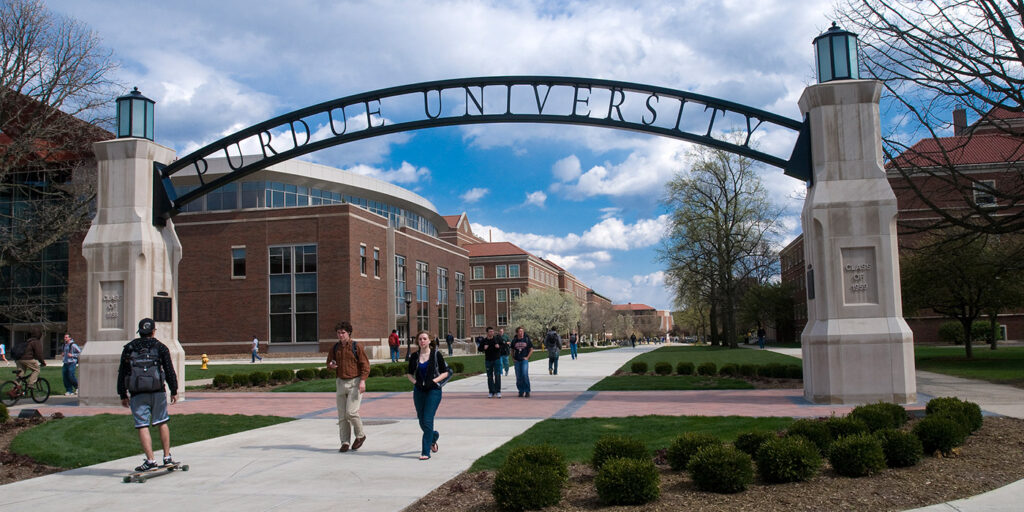First-year files: STEM-focused university
February 2nd, 2021One of my favorite parts of the year comes when we catch up with former advisees who are thriving, and willing to lend insights to help younger students as they ponder college choices. The “First-year Files” concept was developed as a way to facilitate this kind of first-hand knowledge sharing within our Shrop Ed community. Nothing is better than candid insight from someone who is one year ahead in this journey.

In today’s edition of “First-year Files,” we hear from a student attending Purdue University, a large, public, STEM-focused university in West Lafayette, IN. As we know, the first-year experience was more challenging than ever, but Ryan discusses how Purdue facilitates a safe environment, without compromising the rigorous group learning environment for which they’re known. Purdue University’s president was considered somewhat audacious when announcing over the summer that he wanted students on campus this fall. As we see, with careful plans in place, the college experience can still feel relatively normal. Thank you, Ryan, for sharing your experience with us!
In the coming weeks, you will hear from additional first-year college students, and we hope that each of you reading will find a few useful kernels of wisdom that will help in your journey.
Hello, my name is Ryan. I am a freshman at Purdue University, going into my second semester, and planning to study Computer Engineering.
I have absolutely loved my time at Purdue in-person. Even with COVID-19 restrictions in place, it was still a wonderful experience to be able to go to campus and enjoy a modified version of college life. Of course, Coronavirus has made certain aspects of college more challenging, particularly the social aspects (meeting the members of your dorm floor, or your other classmates in general). But like the staff, the students of Purdue all have done their best to adhere to the protocols set in place to protect everyone on campus. Everyone has pitched in, and everywhere you looked indoors, and even most times outdoors on campus, masks were being worn. This plus other endeavors by the university, such as the installation of miles of plexiglass for protection in the classrooms, made me feel very safe on an already safe campus.
Regarding academics at Purdue, the classes are certainly rigorous, as one would expect at a college. Unlike some other top engineering colleges, however, the environment is collaborative, not cutthroat. For example, my engineering course was completely based around working with your team to complete projects and included peer reviews with other teams to better your project. My required written communications course was also based around peer reviews with an assigned group of students allowing you to know their writing style. And both my Calculus I and Chemistry classes fostered an environment that encouraged working together to solve the assignments.
There are three lessons I learned from my first semester that I would like to share that can be applied to any college experience. First off, join a club, organization, or an extracurricular class that makes sense for you. In Purdue, there are also optional Learning Communities (or LCs, as we like to call them) you can join that put people with similar interests in the same dorm. I suggest this because it will give you a chance to meet new people and make friends quickly. You are just about guaranteed to find at least one person you get along with and enjoy similar things when you join a community that is formed for a particular purpose you enjoy. Consider joining a band or orchestra, the chess club, the rowing team, or if you are attending Purdue, an LC, and I’m positive you’ll find “your people” there.
Second, be prepared to step up your academic game. As I mentioned, the classes are highly rigorous, and while I am sure you have heard this 1,000 times, I am here to reinforce that college is academically at a different level than high school. You will be discovering and working with new study habits, new study environments, and new, difficult material, which segues into my next point: the material you will be learning is difficult, so do not fall behind or get complacent.
I have heard horror stories of people getting too complacent with their work or procrastinating too much and getting behind in their assignments. It is a deep hole to dig yourself out of, and not a fun ride either. To help avoid this, do not let yourself be distracted while working, and when you are not doing work and have some free time, make sure to limit the amount of time you spend during your free time. Also, do not let yourself get complacent with your position in your classes. Most classes at Purdue offer what is called SI, or Supplemental Instruction, which adds an extra level of academic support outside of your class recitations. I urge you to attend SI (or the SI equivalent at your college) for your classes, regardless of whether you are passing with an A- or failing (hopefully, it will be the former).
Overall, regardless of what college you will be attending, my three major points for you are that you should find “your people” at college, prepare to adapt to the new, difficult level of work in college, and get academic help before you are in trouble. Armed with those tips, I hope that you will be prepared to transition into your first year of college and onwards!
Good luck college hunting!


